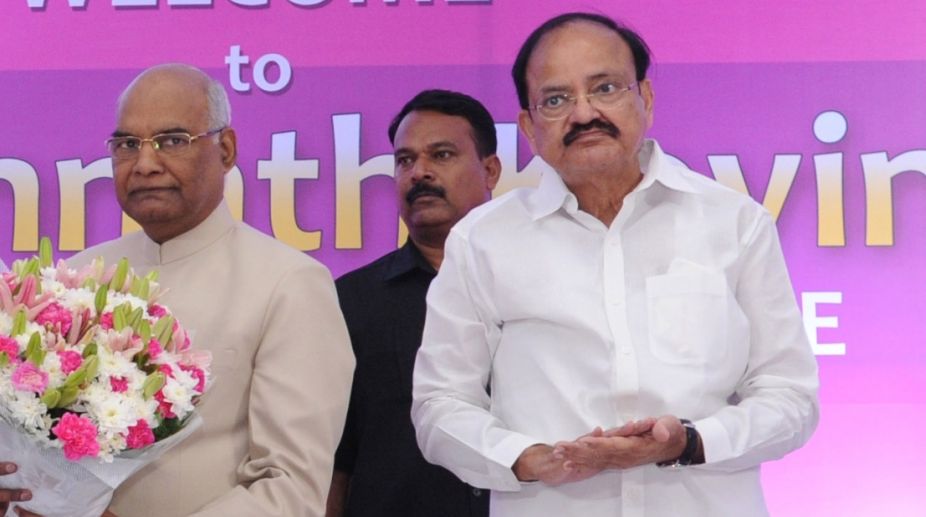Maha Deputy CM Shinde Welcomes Thackeray’s ‘Return To Hindutva’
Maharashtra Deputy Chief Minister Eknath Shinde has welcomed his former leader Uddhav Thackeray's "radical change" in the form of his supposed 'return to Hindutva', on Wednesday.

M Venkaiah Naidu (R) (Photo: IANS)
M Venkaiah Naidu took over on Friday as the Vice President of India in a smooth transition after the term of Hamid Ansari ended on August 9. One important and difficult job of the Vice President is presiding over the Rajya Sabha. Hamid Ansari served as the VP for ten years, time enough indeed to prove himself. Looking for a minority face, the Congress and the Left chose him in 2007 for his credentials as a seasoned diplomat, Vice Chancellor of Aligarh Muslim University and also the Chairman of the Minorities Commission. Ending up in the Vice President’s chair was the peak of his distinguished career. We have had many politicians, a philosopher like S Radhakrishnan, and G.S. Pathak and Hidayatullah from the Judiciary. Ansari was the first diplomat who occupied this office.
The Congress made a rare departure from tradition to re-nominate the incumbent in 2012— only the second after S Radhakrishnan — though Ansari was hoping to move on to Raisina Hill as the President of India. However Pranab Mukherji won the race.
Advertisement
Ansari has been by and large non -controversial, capable, and managed the contradictions in the Upper house with tact and ease. He dealt with two governments – the Manmohan Singh led UPA and now the Modi led NDA. He must have walked on the razor’s edge as the two represent different ideologies, led by two different personalities. The Modi government was waiting to put its own man in the VP’s chair for the past three years.
Advertisement
As the chairman, a diffident Ansari found it difficult to control the house initially but he settled down soon. The Rajya Sabha proceedings were often acrimonious and there were heated discussions and debates with members running to the well of the house. If the BJP did this while it was in the opposition, the Congress is indulging in this now. In fact, most of the time both houses had to be adjourned often in view of the noisy scenes. Ansari performed the difficult job of pacifying members and bringing down passions in the house by meeting them in his chambers to arrive at a truce.
The launch of Rajya Sabha TV in 2011 was another achievement duringhis tenure. From 2014, Hamid Ansari had changed question hour in the house from 12 noon to 1 pm instead of beginning the day from 11 am, a long time practice in both the houses. However, there were also some controversies during his tenyear period. In March 2010, the Vice President ordered seven MPs to be evicted from the House for causing disruptions during the discussion and passage of the Women’s Reservation Bill.
Ansari, a career diplomat all his life, often spoke his mind when he felt he needed to, particularly on dissent and intolerance. On the national anthem he told Karan Thapar in an interview recently that it was unnecessary to prove one’s nationalism constantly, and observed: “I am an Indian and that is it.” He called Triple talaaq a social aberration and not a religious requirement. He has often stressed the importance of pluralism and secularism in our democracy.
In his parting shot in an interview to Rajya Sabha TV last week, he observed, “A sense of insecurity is creeping in as a result of the dominant mood created by some and the resultant intolerance and vigilantism.” This provoked his successor Naidu to remark that Muslims were not insecure. Bidding farewell Prime Minister Narendra Modi told Ansari, “you now have the joy of being liberated, and the opportunity to work, think and speak according to your core beliefs”.
Ansari, on his part, observed: “The Chair is like an umpire in cricket or a referee in a hockey match, witnessing the play and the players, but without becoming a player. Its only source of reference is the book of rules.” This is advice to his successor Venkaiah Naidu who has been a staunch BJP man all his life. Naidu began well by stating when he assumed office on Friday, “I am an all party man, above party politics. I will be a person above politics.”
Naidu has many challenges in the coming five years as he not only has to be impartial but also seem to be impartial. The opposition leaders in the Rajya Sabha stressed this in their speeches when Naidu took over on Friday. He should be a consensus builder in his chambers. Secondly, though he may have an easier time as the months roll by as the BJP has already become the single largest party in the Rajya Sabha and the NDA may soon attain majority in the next biennial elections, his job will not be that easy. He has to be more accommodative to the demands of the opposition. Thirdly, as Prime Minister noted on Friday, since Naidu had spent so many years in the Upper House some members might feel initial discomfort similar to the one faced by lawyers when one of them becomes a judge. Naidu has to deal with this aspect. Fourthly, though it is expected that the BJP may come back after 2019, politics is unpredictable and two years is quite a long in politics.
Advertisement